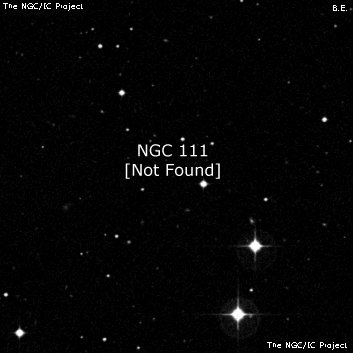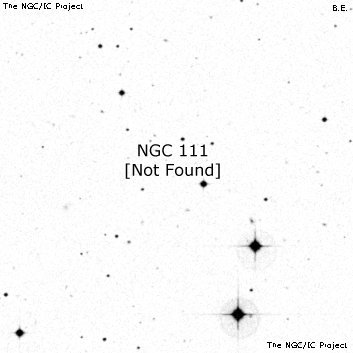NGC/IC Project Restoration Effort
(This is a very very beta version)
NGC111


Basic Information
Location and Magnitude
Right Ascension: 0:26:38.3
Declination: -2:37:30
Constellation: CET
Visual Magnitude:
Historic Information
Discoverer: Leavenworth
Year of discovery: 1886
Discovery aperture: 26.3
Observational
Summary description: vF, S, R, lbM, * 8.5 p 36s, n 2' (?=5100)
Sub-type: NF
Corwin's Notes
=====
NGC 111. I cannot see anything within 5 degrees of Leavenworth's position
that agrees with his description of a "vF, vS, R, lbM; * 8.5 p 36 sec, n 2
arcmin. [alpha] doubtful." There is a very faint, peculiar pair of galaxies
(MCG -01-02-013) at the approximate offsets he gives from the nearby star --
but the star is 10th or 11th magnitude, and his description of the galaxy does
not match the relatively low surface brightness twisted streamers that
contribute most of the light of the pair. There is no sketch included in
Stone's papers at the University of Virginia.
The galaxy may not be irretrieveably lost, however. Since the declinations
in the first two Leander McCormick lists are generally (though not always!)
reliable to within a couple of arcminutes, it may be possible to scan around
the sky at Leavenworth's declination to find the object (see e.g. NGC 331). I
haven't tried yet, however.
-----
In July 2016, John Ponting sent around an email suggesting that this object
may be identical to NGC 758 (coincidentally also found by Leavenworth). The
descriptions are very similar ("vF, vS, R?; [alpha] doubtful"), and the star
is there. The problem, of course, is that the (doubtful!) RA is 1.5 hours
different, and the declination is 20 arcminutes off, too. John suggests that
Leavenworth confused his hour angle reading at the telescope making it
positive instead of negative. This would have added 1.5 hours to the RA.
NGC 758 has a star of the right magnitude at the right distance to the
west-northwest which gives further confidence in the identity. This all
strikes me as reasonable, so I have listed the identity as a possibility.



